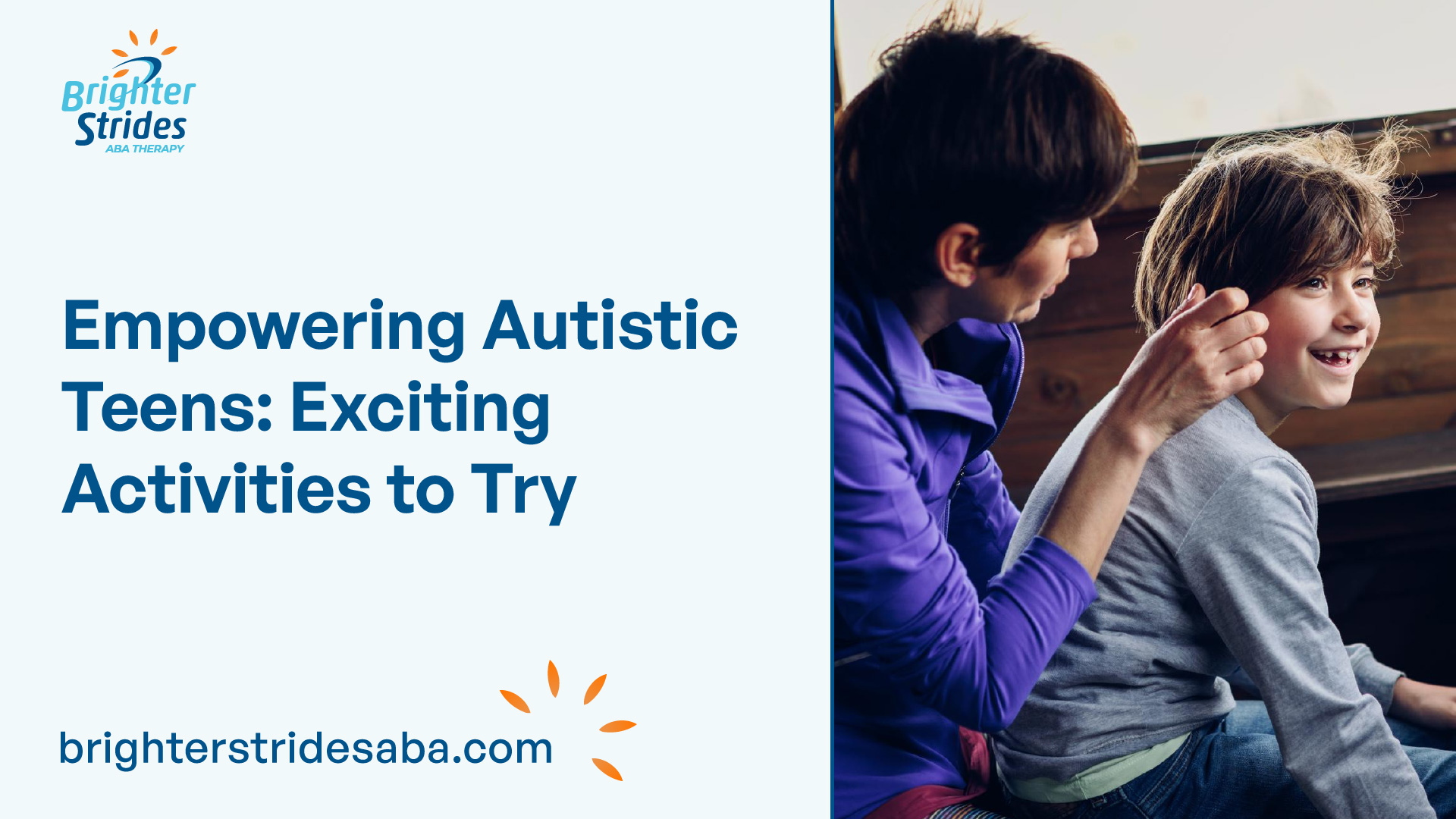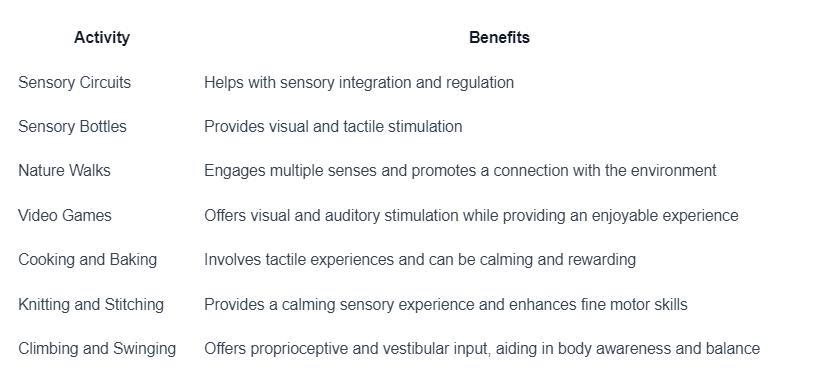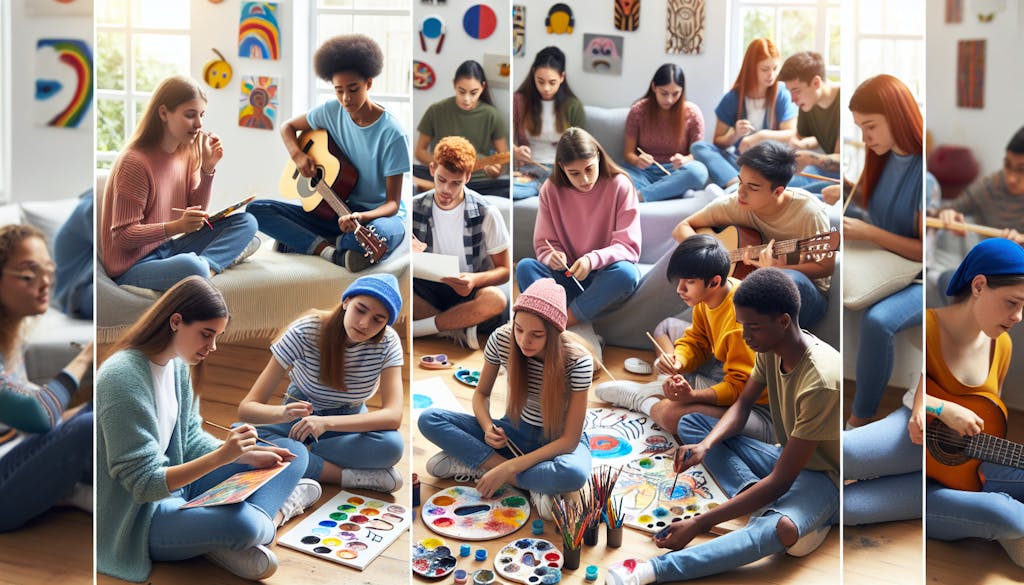Engaging Activities for Autistic Teenagers
Engaging in recreational activities is crucial for the overall well-being and development of autistic teenagers. Recreation provides them with opportunities for growth, learning, and enjoyment. It plays a vital role in promoting their physical, social, and emotional well-being. Understanding the importance of recreation and creating inclusive activities are essential steps towards supporting and empowering autistic teenagers.

Importance of Recreation
Recreation offers a range of benefits for autistic teenagers. By participating in recreational activities, they can enhance their social skills, communication abilities, motor coordination, and sensory processing. Engaging in enjoyable activities provides a platform for them to explore their interests, express themselves creatively, and build self-confidence. Some of the key reasons why recreation is important for autistic teenagers include:
- Social Interaction: Participating in recreational activities offers opportunities for autistic teenagers to interact with peers and form meaningful connections. It allows them to engage in shared experiences, fostering a sense of belonging and helping them develop friendships based on shared interests.
- Skill Development: Recreation provides a platform for autistic teenagers to develop and improve various skills. Whether it’s through team sports, art classes, or music lessons, they can enhance their communication, problem-solving, and decision-making abilities. Engaging in recreational activities can also promote physical fitness and improve motor skills.
- Stress Relief and Emotional Well-being: Recreation can serve as a means of stress relief and relaxation for autistic teenagers. Engaging in enjoyable activities can help reduce anxiety and improve overall emotional well-being. By participating in recreational activities, they can experience a sense of accomplishment, boost their self-esteem, and develop a positive outlook on life.
Benefits of Recreational Activities
Participating in recreational activities offers a multitude of benefits for autistic teenagers. These activities provide a safe and inclusive environment for them to explore their interests, develop new skills, and have fun. Some of the key benefits of engaging in recreational activities include:
- Enhanced Social Skills: Recreation allows autistic teenagers to practice and develop their social skills in a supportive environment. By interacting with others, they can improve their communication, cooperation, and teamwork abilities.
- Improved Self-Confidence: Engaging in recreational activities gives autistic teenagers a sense of accomplishment and boosts their self-esteem. As they develop new skills, overcome challenges, and receive positive feedback, their confidence grows.
- Physical Fitness: Many recreational activities involve physical movement, promoting physical fitness and overall well-being. Engaging in activities such as swimming, biking, or team sports can improve coordination, strength, and cardiovascular health.
- Creative Expression: Recreation provides an outlet for autistic teenagers to express themselves creatively. Whether it’s through art, music, or drama, engaging in creative activities allows them to explore their talents and interests, fostering self-expression and personal growth.
By recognizing the importance of recreation and embracing inclusive activities, we can empower autistic teenagers to thrive and enjoy fulfilling lives. By providing them with opportunities for recreation, we can support their social, emotional, and physical well-being while fostering their personal growth and development.
Therapeutic Activities for Autistic Teens
Engaging in therapeutic activities can greatly benefit autistic teenagers, providing them with opportunities for emotional expression, skill development, and overall well-being. In this section, we will explore three therapeutic activities specifically tailored for autistic teens: art therapy, music therapy, and outdoor adventures.
Art Therapy Benefits
Art therapy offers various benefits for autistic teenagers, both emotionally and cognitively. It allows individuals to express themselves creatively, explore their emotions, and develop important skills [1]. Through art, autistic teens can communicate their thoughts and feelings in a non-verbal manner, helping them express themselves in a way that feels comfortable and natural.
Some key benefits of art therapy for autistic teens include:
- Self-expression: Art provides a safe and non-judgmental space for self-expression, allowing autistic teenagers to communicate their inner experiences and perspectives.
- Emotional exploration: Engaging in art can help autistic teens explore and process their emotions, promoting self-awareness and emotional well-being.
- Skill development: Art therapy promotes the development of fine motor skills, hand-eye coordination, and concentration, fostering personal growth and increased self-confidence.
Music Therapy Benefits
Music therapy has been shown to have a positive impact on the emotional, cognitive, and social development of autistic teenagers. It harnesses the power of music to facilitate self-expression, emotional regulation, and improved social skills [1].
Key benefits of music therapy for autistic teens include:
- Self-expression: Music offers a creative outlet for self-expression, allowing autistic teenagers to communicate and connect with others through a universal language.
- Emotional regulation: Engaging in musical activities can help autistic teens regulate their emotions, promoting relaxation, reducing anxiety, and enhancing emotional well-being.
- Social skills development: Music therapy provides opportunities for social interaction and collaboration, helping autistic teens improve their communication and social skills.
Outdoor Adventures
Engaging in outdoor adventures can be an enriching and enjoyable experience for autistic teenagers. These activities provide them with opportunities to explore their surroundings, connect with nature, and develop various skills. Outdoor adventures offer a range of benefits, including sensory stimulation, physical fitness, and enhanced problem-solving skills.
Some advantages of outdoor adventures for autistic teens include:
- Sensory stimulation: Being in nature can provide a rich sensory experience, helping autistic teens engage and regulate their senses.
- Physical fitness: Outdoor activities encourage physical movement, promoting overall health and well-being.
- Problem-solving skills: Outdoor adventures often present challenges that require problem-solving and decision-making, fostering cognitive development and critical thinking.
Engaging in therapeutic activities like art therapy, music therapy, and outdoor adventures can provide autistic teenagers with valuable opportunities for self-expression, skill development, and personal growth. These activities can be tailored to individual interests and preferences, ensuring a meaningful and enjoyable experience for each autistic teen.
Sensory Activities for Autistic Teens
Autistic teenagers often have unique sensory processing differences and may require activities that cater to their sensory needs. Engaging in sensory activities can aid in sensory integration, reduce anxiety and stress, and help regulate sensory systems. Let’s explore the importance of sensory activities and the different types of activities that can be beneficial for autistic teens.
Sensory Integration
Sensory integration refers to the brain’s ability to organize and interpret sensory information from the environment and the body. Autistic teenagers may struggle with sensory processing, becoming easily overwhelmed or needing more sensory stimulation than others. Engaging in sensory activities can help them process and respond to sensory information more effectively, leading to improved overall sensory integration.
Sensory Seeking vs. Sensory Avoiding
Autistic teens may exhibit sensory seeking or sensory avoiding behaviors. Sensory seeking behaviors involve actively seeking out sensory stimulation, such as loud noises or strong smells. These behaviors can help them regulate their sensory systems and manage their arousal levels. On the other hand, sensory avoiding behaviors involve actively avoiding or withdrawing from overwhelming sensory experiences. Both sensory seeking and sensory avoiding behaviors can be challenging, so providing structured sensory activities is crucial in supporting their sensory needs.
Therapeutic Sensory Activities
Sensory activities can provide therapeutic benefits for autistic teenagers, aiding in sensory integration, regulation, cognitive development, self-expression, and social interaction. Here are some examples of sensory activities that can be beneficial:

These activities can be tailored to individual preferences and sensitivities. It’s important to create a safe and supportive environment while engaging in sensory activities, allowing autistic teens to explore and regulate their sensory experiences [4].
By incorporating sensory activities into the daily routines of autistic teenagers, caregivers, educators, and therapists can empower them to effectively manage sensory challenges, enhance their well-being, and promote their overall development.
Physical Exercise for Autistic Teens
Engaging in physical exercise can have numerous benefits for autistic teenagers. It not only promotes overall health and well-being but also plays a vital role in their social and behavioral development. Let’s explore the impact of exercise on autistic teens and some specific activities that can be beneficial for them.
Impact of Exercise
Research has shown that exercise can improve the social and behavioral skills of children and adolescents with autism spectrum disorders [5]. A 48-week exercise intervention program was found to substantially decrease social interaction problems, attention deficit, emotional reactivity, stereotypical verbal and motor behavior, and sleep disturbances in autistic individuals. While exercise did not affect eye contact and food selectivity, the severity of autism and socioeconomic status were found to influence certain responses in autistic individuals.
Swimming
Swimming is an excellent physical activity for autistic teens. It provides a range of benefits, including improved muscular strength, endurance, and overall fitness. Swimming is a low-impact exercise that puts minimal stress on the joints, making it suitable for individuals with sensory sensitivities.
In addition to the physical benefits, swimming can also help develop water safety skills and boost self-confidence. The water provides a calming and sensory-friendly environment for autistic teens, allowing them to engage in a non-threatening, enjoyable activity.
Art and Crafts Activities
Engaging in art and crafts activities can be a creative and therapeutic outlet for autistic teens. These activities allow them to express themselves, develop fine motor skills, and enhance their focus and attention to detail. Art therapy can provide a sense of accomplishment and self-esteem for individuals on the autism spectrum.
When choosing art and crafts activities, it’s important to consider the individual’s interests and sensory preferences. Some popular options include painting, drawing, sculpting, and collage-making. Providing a variety of materials and tools can encourage exploration and creativity.
By participating in these physical activities, autistic teens can experience various benefits, including improved social and communication skills, enhanced motor skills, and increased self-confidence. It is crucial to approach exercise with flexibility and cater to individual preferences and needs. Encouraging regular physical activity in a supportive and inclusive environment can make a significant difference in the lives of autistic teenagers.
Social Skills Development
Developing social skills is an important aspect of empowering autistic teenagers to navigate social interactions and build meaningful relationships. Several interventions and strategies can be beneficial in supporting their social development. This section will explore three approaches: cognitive behavior therapy (CBT), peer training, and social skills training.
Cognitive Behavior Therapy (CBT)
Cognitive behavior therapy, commonly known as CBT, is an effective intervention for older autistic children and teenagers. It is based on the idea that thoughts, feelings, and behaviors are interrelated, and by replacing negative thoughts with positive ones, individuals can improve their self-esteem and increase socialization.
In CBT sessions, trained professionals work with autistic teenagers to identify and challenge negative thought patterns that may hinder their social interactions. By replacing these negative thoughts with more positive and realistic ones, individuals can develop healthier coping mechanisms and enhance their social skills.
Peer Training
Peer training involves teaching typically developing children strategies for playing and interacting with autistic individuals who may have social skills challenges. This interaction provides autistic teenagers with increased social opportunities and skills development. Through peer training, autistic individuals can learn from their typically developing peers and practice social interactions in a supportive and inclusive environment.
Peer training programs often involve structured activities and role-playing scenarios that focus on teaching social skills such as turn-taking, listening, and understanding non-verbal cues. These programs can be conducted in schools, community centers, or other group settings, allowing autistic teenagers to learn and practice social skills alongside their peers.
Social Skills Training
Social skills training is an essential intervention for autistic teenagers, as it helps them understand non-verbal cues, social rules, and problem-solving. These programs can be conducted one-on-one or in groups and may include outings to practice new skills in various settings. The structured nature of social skills training allows autistic teenagers to learn and practice specific social skills in a supportive and controlled environment [6].
In social skills training programs, professionals provide guidance and instruction on topics such as initiating conversations, maintaining eye contact, interpreting facial expressions, and managing conflict. These programs often utilize visual supports, role-playing, and real-life scenarios to enhance learning and generalization of social skills.
By incorporating cognitive behavior therapy, peer training, and social skills training, autistic teenagers can gain the necessary tools and strategies to navigate social situations with confidence. These interventions provide valuable support and guidance, helping autistic individuals develop their social skills and foster meaningful connections with others.
Supporting Social Skills
When it comes to supporting social skills development in autistic teenagers, there are various strategies that can be beneficial. In this section, we will explore three effective approaches: visual supports, utilizing videos, and social stories.
Visual Supports
Visual supports play a crucial role in helping autistic teenagers navigate social interactions effectively. These supports can include pictures depicting social cues such as facial expressions, body language, and prompt cards highlighting actions in different situations. By providing visual representations of social expectations, autistic teenagers can better understand and interpret social cues.
Visual schedules and visual cues can also be used to support comprehension and participation in social activities. These visual aids provide a clear representation of what is expected and can help autistic teenagers follow social expectations and routines.
Utilizing Videos
Videos can be a valuable tool in teaching social skills and appropriate behaviors to autistic teenagers. Ready-made or self-created videos can provide visual examples and demonstrations of various social contexts, allowing autistic teenagers to observe and learn from them. Videos can help them understand how people interact, interpret nonverbal cues, and respond appropriately in different social situations.
Social media platforms can also be utilized to teach social skills to autistic teenagers. These platforms offer opportunities for controlled social interaction and practice, allowing them to engage in conversations and share experiences in a supportive environment. This can help them develop and refine their social skills.
Social Stories
Social stories are a powerful tool for teaching social rules and promoting social understanding in autistic teenagers. These stories provide structured narratives that explain social situations, social cues, and appropriate behaviors. They can cover topics like greetings, personal space, or understanding perspectives, fostering empathy and social awareness. By using relatable and engaging stories, social stories help autistic teenagers understand social expectations and navigate social interactions.
Through the use of visual supports, videos, and social stories, autistic teenagers can develop and enhance their social skills. These strategies provide them with the tools and guidance they need to understand social cues, interact appropriately, and build meaningful connections with others. It’s important to tailor these supports to individual needs and preferences, creating an environment that supports their social growth and empowers them to thrive.
References
- https://www.abtaba.com/blog/activities-for-autistic-teens
- https://www.totalcareaba.com/autism/activities-for-autistic-teenagers
- https://www.autismspeaks.org/expert-opinion/autism-exercise-benefits
- https://www.theyarethefuture.co.uk/sensory-activities-autistic-teenagers/
- https://www.ncbi.nlm.nih.gov/pmc/articles/PMC9813515/
- https://raisingchildren.net.au/autism/therapies-services/therapies-interventions/interventions-for-older-children-with-asd
- https://raisingchildren.net.au/autism/communicating-relationships/connecting/social-skills-for-teens-with-asd

 We've just released an article!
Check out our blog!
We've just released an article!
Check out our blog!



